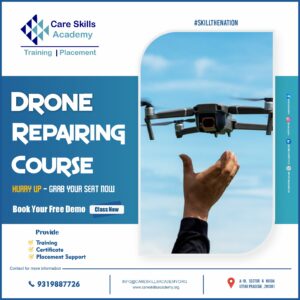
Master the Sky with Our Drone Repairing Course: A Comprehensive Guide to Your Next Big Opportunity
In recent years, drones have revolutionized various industries, from photography and agriculture to logistics and surveillance. However, with the increasing use of drones comes the inevitable need for maintenance and repair. This growing demand has created a lucrative opportunity for skilled drone repair technicians. If you’re passionate about technology and looking to dive into a future-proof career, enrolling in a drone repairing course might just be your best move.
Why Learn Drone Repairing?
The global drone market is expanding rapidly, with new models and technologies being introduced constantly. As drones become more complex, the need for specialized repair services has skyrocketed. By learning how to repair drones, you not only gain a highly sought-after skill but also position yourself in a niche market with abundant opportunities.
Drone repair isn’t just about fixing broken parts. It involves understanding the intricate components of drones, including motors, propellers, sensors, cameras, GPS modules, and flight controllers. Mastering these elements allows you to troubleshoot and resolve issues effectively, ensuring optimal drone performance.
What You’ll Learn in a Drone Repairing Course
Our drone repairing course is designed to equip you with both theoretical knowledge and practical skills. Here’s a glimpse of what you can expect:
- Drone Anatomy and Components: Learn about the different parts of a drone and how they function together to achieve flight.
- Troubleshooting Techniques: Identify common issues like motor malfunctions, sensor failures, and connectivity problems.
- Repair and Maintenance: Get hands-on experience fixing damaged parts, replacing components, and performing routine maintenance to extend drone life.
- Software Updates and Calibration: Understand how to update firmware and calibrate drones for better performance.
- Safety Protocols: Learn essential safety measures to follow during repairs and test flights.
Who Can Join This Course?
Our drone repairing course is open to everyone—whether you’re a hobbyist, a tech enthusiast, or someone looking to start a new career. No prior experience in electronics or drone technology is required. Our instructors will guide you step-by-step, making the learning process accessible and enjoyable for beginners and professionals alike.
Career Opportunities in Drone Repairing
Upon completing the course, you’ll be ready to explore a variety of career paths:
- Freelance Technician: Offer your repair services to individual drone users.
- Repair Shop Specialist: Work with companies specializing in drone maintenance.
- Drone Fleet Manager: Maintain and manage drones for businesses in industries like agriculture, delivery, or security.
- Entrepreneur: Start your own drone repair and service business.
With drones being integral to so many industries, the possibilities are endless. Moreover, as drones evolve, your skills will remain relevant, giving you a competitive edge.
Why Choose Our Course?
Our course stands out because of its comprehensive curriculum, expert instructors, and hands-on training modules. We focus on practical learning to ensure you’re job-ready from day one. Plus, our flexible online format allows you to learn at your own pace, making it ideal for working professionals or students.
How to Enroll
Admissions for our drone repairing course are now open. Seats are limited, so don’t wait too long to secure your spot. Register today and take the first step toward a rewarding career in drone technology.
Conclusion
Drone repairing is a skill that’s in high demand and offers immense potential for growth. By enrolling in our course, you’re not just learning a technical skill—you’re investing in a future-proof career. Whether you want to work independently or join a leading company, this course will give you the tools and confidence to succeed. So, why wait? Start your journey in the exciting world of drones today!
